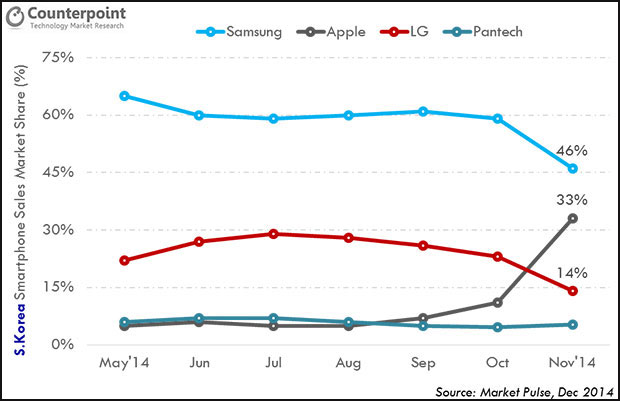Samsung’s Smartphone Market Share Slips In Home Market, Apple Surges
Losing is tough enough as it is, but to lose on your home turf? That adds some extra salt to the wound. Samsung is going to know what that feels like if it doesn't turn things around, and fast. That's because Apple is gaining significant ground in smartphone market share on Samsung's home turf, snagging 33 percent of the market in South Korea in November, according to data by Counterpoint Research.
Apple's 33 percent slice of the pie represents the highest ever for a foreign brand, and unless the Galaxy S6 turns things around in dramatic fashion, Samsung's rival could lead the market by the end of the year. It certainly seems that's the direction things are going -- Samsung's share ended up at 46 percent, down from around 60 percent for the five months prior to November.

"No foreign brand has gone beyond the 20 percent market share mark in the history of Korea’s smartphone industry. It has always been dominated by the global smartphone leader, Samsung. But iPhone 6 and 6 Plus have made a difference here, denting the competition’s phablet sales," said Tom Kang, Counterpoint's Research Director based in Korea. "Korea being the world’s highest penetrated phablet market (handsets with 5-inch above screens) earnestly needed a large screen iPhone for quite a time and now this thirst has been quenched. If there was a better supply of iPhone 6 & 6 Plus 64GB & 128GB models (popular SKUs) during the month then Apple’s share could have climbed to the 40 percent level."
There's a lot riding on the Galaxy S6 for Samsung, and to make things even more interesting, the company is taking a gamble by swapping out the forthcoming phone's Qualcomm Snapdragon 810 processor due to concerns about overheating. Instead, it's presumed Samsung will use it's own Exyno architecture, though if the Snapdragon 810 proves a better performer, Samsung could face stiff competition from other manufacturers that are sticking with the chip, like LG and its G Flex 2.


